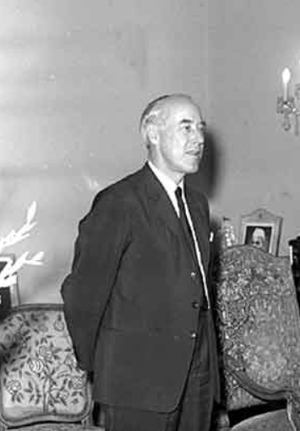Difference between revisions of "Sven Dahlman"
(adding picture) |
(general expand) |
||
| Line 3: | Line 3: | ||
|description=Swedish diplomat and journalist | |description=Swedish diplomat and journalist | ||
|image=Sven dahlman.png | |image=Sven dahlman.png | ||
| + | |image_caption=Dahlman in Cairo in 1961 | ||
|nationality=Swedish | |nationality=Swedish | ||
|birth_date=2 January 1905 | |birth_date=2 January 1905 | ||
|birth_place=Härnösand, Sweden | |birth_place=Härnösand, Sweden | ||
| + | |alma_mater=Uppsala University, Helsingfors University | ||
|death_date=6 May 2000 | |death_date=6 May 2000 | ||
|death_place= Stockholm, Sweden | |death_place= Stockholm, Sweden | ||
|constitutes=diplomat, journalist | |constitutes=diplomat, journalist | ||
}} | }} | ||
| + | Sven Dahlman was a Swedish diplomat. | ||
| + | |||
| + | ==Career== | ||
| + | In [[1933]], after his studies, he became an editorial writer for the newspaper Upsala Nya Tidning. In [[1936]] he became press attaché at the Swedish Embassy in Helsinki, before formally joining the Foreign Ministry as a career diplomat. During the Helsinki period, he had to handle the so-called the Åland question, ie questions about certain security relations between Finland and Sweden with the [[Åland islands]] as focus. | ||
| + | |||
| + | When the [[Soviet union]] [[Winter War|declared war]] on [[Finland]] on 30 November [[1939]], Dahlman left the Ministry of Foreign Affairs and joined the [[Swedish Finland Committee]], who arranged aid and military support for Finland. He had responsibility for the Information and Propaganda Department. The Committee had significant discreet support from the military, big business and also from the Social Democrat Swedish government. Even so, Dahlman became one of the most passionate and unabashed critics of official Finnish policy, claiming it was too slow and not sufficient<ref>https://www.svensktidskrift.se/namn-att-minnas-sven-dahlman/</ref>. | ||
| + | |||
| + | Between 1940-45, he worked in the embassy in Washington, as a legation councilor, and then again to the Foreign Ministry in Stockholm as head of the press office. | ||
| + | |||
| + | ==After WW2== | ||
| + | Foreign Minister [[Östen Undén |Undén]] appointed him head of the Foreign Ministry's political department at the age of 43, and he remained in the post 1948-1953, during which time, among other things, he dealt with the sensitive business of [[Raoul Wallenberg]], and the so-called [[Catalina affair]], (when a Swedish seaplane spying on behalf of the [[USA]] was shot down by the [[Soviet Union]] over the Baltic Sea), and how to deal with the newly formed [[NATO]].<ref>http://www.dab.se/Sven%2520Dahlman.doc</ref> | ||
| + | |||
| + | In 1953, he was appointed ambassador to the [[Netherlands]], and the [[Egypt]] 1961-62, both positions of relative little importance, as the Foreign Minister disliked him, "a mismanagement of his talent, which approached personal persecution".<ref>https://www.svensktidskrift.se/namn-att-minnas-sven-dahlman/</ref> | ||
| + | |||
| + | He finished his career as Vice-President of the [[Swedish Confederation of Industry]] with responsibility for international and European integration issues and, a more honorary function, as chamberlain for King [[Gustaf VI Adolf]]. | ||
| + | |||
{{SMWDocs}} | {{SMWDocs}} | ||
==References== | ==References== | ||
{{reflist}} | {{reflist}} | ||
| − | |||
Latest revision as of 23:26, 27 December 2020
(diplomat, journalist) | |
|---|---|
 Dahlman in Cairo in 1961 | |
| Born | 2 January 1905 Härnösand, Sweden |
| Died | 6 May 2000 (Age 95) Stockholm, Sweden |
| Nationality | Swedish |
| Alma mater | Uppsala University, Helsingfors University |
Swedish diplomat and journalist | |
Sven Dahlman was a Swedish diplomat.
Career
In 1933, after his studies, he became an editorial writer for the newspaper Upsala Nya Tidning. In 1936 he became press attaché at the Swedish Embassy in Helsinki, before formally joining the Foreign Ministry as a career diplomat. During the Helsinki period, he had to handle the so-called the Åland question, ie questions about certain security relations between Finland and Sweden with the Åland islands as focus.
When the Soviet union declared war on Finland on 30 November 1939, Dahlman left the Ministry of Foreign Affairs and joined the Swedish Finland Committee, who arranged aid and military support for Finland. He had responsibility for the Information and Propaganda Department. The Committee had significant discreet support from the military, big business and also from the Social Democrat Swedish government. Even so, Dahlman became one of the most passionate and unabashed critics of official Finnish policy, claiming it was too slow and not sufficient[1].
Between 1940-45, he worked in the embassy in Washington, as a legation councilor, and then again to the Foreign Ministry in Stockholm as head of the press office.
After WW2
Foreign Minister Undén appointed him head of the Foreign Ministry's political department at the age of 43, and he remained in the post 1948-1953, during which time, among other things, he dealt with the sensitive business of Raoul Wallenberg, and the so-called Catalina affair, (when a Swedish seaplane spying on behalf of the USA was shot down by the Soviet Union over the Baltic Sea), and how to deal with the newly formed NATO.[2]
In 1953, he was appointed ambassador to the Netherlands, and the Egypt 1961-62, both positions of relative little importance, as the Foreign Minister disliked him, "a mismanagement of his talent, which approached personal persecution".[3]
He finished his career as Vice-President of the Swedish Confederation of Industry with responsibility for international and European integration issues and, a more honorary function, as chamberlain for King Gustaf VI Adolf.
Event Participated in
| Event | Start | End | Location(s) | Description |
|---|---|---|---|---|
| Bilderberg/1963 | 29 March 1963 | 31 March 1963 | France Cannes Hotel Martinez | The 12th Bilderberg meeting and the second one in France. |